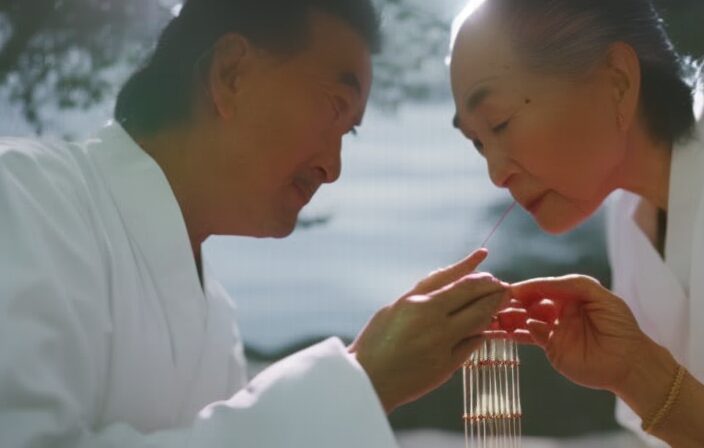In the realm of Chinese medicine, the lunar calendar serves as a guiding force, shaping diagnostic techniques, treatment approaches, and overall health practices.
Much like the moon’s gravitational pull influences the tides, the lunar calendar’s influence on Chinese medicine is deeply rooted in the correlation between natural cycles and the human body.
This article delves into the historical origins of the lunar calendar in Chinese medicine and explores how this ancient wisdom continues to shape acupuncture, herbal medicine, and dietary therapy for optimal health.
Key Takeaways
- The lunar calendar in Chinese medicine has been used for thousands of years and is based on the cycles of the moon.
- The lunar calendar divides time into twelve animal signs, each associated with specific characteristics and energy patterns.
- The lunar cycle has a significant impact on various aspects of health, including menstrual health and sleep patterns.
- The lunar calendar is used in Chinese medicine to diagnose and treat health conditions, as well as to determine optimal timing for acupuncture treatments and dietary adjustments.
Historical Origins of the Lunar Calendar in Chinese Medicine
The historical origins of the lunar calendar in Chinese medicine can be traced back thousands of years. Chinese medicine, with its holistic approach to health and well-being, has long recognized the significance of the lunar cycle in understanding the body’s energy and promoting balance. The lunar calendar, also known as the lunar or Chinese zodiac calendar, is based on the cycles of the moon and has been used for timekeeping and agricultural purposes in ancient China.
The lunar cycle’s significance in Chinese medicine lies in its connection to the body’s vital energy, or qi, and its influence on various physiological processes. According to traditional Chinese medicine, the lunar calendar is divided into twelve animal signs, each associated with specific characteristics and energy patterns. These animal signs are believed to influence the body’s organs, meridians, and overall health.
For example, the Year of the Rat is associated with the kidney system, while the Year of the Dragon is linked to the liver system. Understanding the lunar calendar allows Chinese medicine practitioners to tailor treatments and therapies according to the energy patterns of specific animal signs.
In addition to the animal signs, the lunar calendar also incorporates the five elements of wood, fire, earth, metal, and water. Each element represents different aspects of health and well-being, and their interactions with the animal signs further deepen the understanding of the body’s energy dynamics. By aligning treatments and lifestyle recommendations with the lunar calendar, Chinese medicine aims to enhance the body’s natural healing abilities and promote optimal health.
The historical origins of the lunar calendar in Chinese medicine demonstrate the deep connection between nature, the lunar cycle, and the human body. By recognizing the influence of the lunar calendar on the body’s energy patterns, Chinese medicine practitioners can provide personalized and effective treatments that address the root causes of health issues. This ancient wisdom continues to be passed down through generations, ensuring the ongoing relevance and efficacy of the lunar calendar in Chinese medicine.
Understanding the Lunar Cycle and Its Impact on Health
Understanding the relationship between the lunar cycle and health is crucial in comprehending the holistic approach of traditional Chinese medicine. In Chinese medicine, the lunar cycle is believed to have a significant impact on various aspects of health, including menstrual health and sleep patterns.
According to traditional Chinese medicine, the lunar cycle is closely linked to a woman’s menstrual cycle. The lunar calendar is divided into 29.5 days, which is similar to the average length of a menstrual cycle. It is believed that the different phases of the lunar cycle correspond to different phases of the menstrual cycle. For example, the new moon is associated with menstruation and the full moon is associated with ovulation. Understanding these associations can help women better understand and manage their menstrual health.
In addition to menstrual health, the lunar cycle is also thought to influence sleep patterns. Traditional Chinese medicine suggests that the energy of the body fluctuates with the lunar cycle. During the new moon and full moon phases, when the energy is at its peak, individuals may experience more restless sleep or have difficulty falling asleep. On the other hand, during the waning and waxing phases, when the energy is lower, individuals may experience deeper and more restful sleep.
Lunar Calendar-Based Diagnostics in Chinese Medicine
Lunar Calendar-Based Diagnostics in Chinese Medicine is a practice that utilizes the lunar calendar to diagnose and treat health conditions. According to ancient Chinese wisdom, the moon’s phases have a direct influence on the body’s energy and overall health.
This approach is rooted in the belief that different organs and meridians within the body are more active during certain lunar phases, providing valuable insights into a person’s health status.
Lunar Cycle Health
In traditional Chinese medicine, the lunar cycle plays a significant role in determining the overall health and well-being of individuals. The lunar calendar is believed to influence various aspects of our health, including menstrual health and sleep patterns.
• Lunar cycle and menstrual health:
- Chinese medicine suggests that women’s menstrual cycles are closely linked to the lunar cycle.
- It is believed that certain phases of the moon can affect the regularity and intensity of menstrual flow.
• Lunar cycle and sleep patterns:
- Chinese medicine recognizes the influence of the lunar cycle on sleep patterns.
- The full moon is believed to have a stimulating effect on the body, potentially causing sleep disturbances or insomnia.
According to Chinese medicine, aligning our lifestyle and health practices with the lunar cycle can help promote balance and well-being. By understanding these connections, individuals can make informed choices to optimize their health.
Diagnostic Link to Moon
One interesting area of study is the potential diagnostic link between the moon and certain health conditions. While the moon’s effect on health is often attributed to its influence on sleep patterns and mental well-being, there is growing evidence to suggest that lunar energy may have a direct impact on diagnosing and treating diseases.
According to traditional Chinese medicine, the moon’s energy can affect the flow of Qi (life force) in the body, which in turn can influence various organ systems. This understanding has led to the development of lunar-based diagnostic techniques, such as pulse diagnosis during specific lunar phases. By examining the pulse rate and quality during different lunar phases, practitioners can gain insights into imbalances and potential health conditions.
While further research is needed to fully understand the diagnostic link between the moon and health, this area of study holds promise for a more holistic approach to healthcare.
Ancient Wisdom or Superstition?
The belief in the moon’s influence on health and its potential diagnostic capabilities has been a topic of debate among scholars, with some questioning whether it is rooted in ancient wisdom or simply superstition. While there is limited scientific evidence to support the idea that the lunar calendar can directly impact fertility, there are cultural and historical reasons why this belief persists.
Some proponents argue that the lunar cycle, with its waxing and waning phases, mirrors the menstrual cycle, suggesting a connection between the lunar calendar and fertility.
Others believe that the moon’s gravitational pull can affect the human body, including hormone levels and reproductive processes.
In addition to fertility, the lunar cycle has also been linked to mental health. Some studies have found that certain mental health conditions, such as bipolar disorder, may be influenced by the moon’s phases. However, more research is needed to fully understand the nature of this relationship.
The Lunar Calendar’s Influence on Acupuncture Practices
The lunar calendar has a significant influence on acupuncture practices, as it guides practitioners to make seasonal adjustments in their treatments. According to traditional Chinese medicine, each season is associated with specific meridians and acupuncture points that are more active and responsive during that time.
Additionally, the lunar phases are believed to affect the flow of Qi (energy) in the body, and acupuncture treatments are often tailored accordingly to optimize therapeutic outcomes.
Seasonal Acupuncture Adjustments
Seasonal acupuncture adjustments are an integral part of traditional Chinese medicine, allowing practitioners to address specific health concerns according to the lunar calendar. These seasonal acupuncture techniques take into consideration the natural cycles and energies that occur throughout the year, and how they can influence our overall well-being.
When it comes to fertility treatments, the lunar calendar plays a significant role. According to Chinese medicine, certain times of the year are considered more auspicious for conceiving and promoting fertility. By aligning acupuncture treatments with the lunar calendar, practitioners can optimize the chances of success for individuals undergoing fertility treatments.
This approach takes into account the energetic shifts that occur during different seasons, and how they can impact reproductive health. By tailoring acupuncture treatments to specific seasons, practitioners can enhance the body’s natural fertility potential and support overall reproductive health.
- The lunar calendar provides insights into the energetic shifts that occur during different seasons.
- By aligning acupuncture treatments with the lunar calendar, practitioners can optimize fertility treatments and increase success rates.
Lunar Phases and Meridians
Aligning acupuncture treatments with the natural cycles of the moon allows practitioners to effectively target specific meridians and optimize overall well-being. The lunar phases have long been recognized as influential forces in various aspects of human life, including sleep patterns and emotional well-being.
In Chinese medicine, it is believed that different meridians are more active during specific lunar phases, and by understanding this correlation, acupuncturists can enhance treatment outcomes.
During the full moon, for example, the Kidney and Liver meridians are believed to be at their peak, making it an ideal time for treatments targeting these areas. The Kidney meridian is associated with maintaining sleep patterns, so individuals experiencing insomnia may benefit from acupuncture during this phase. Similarly, the Liver meridian is connected to emotional well-being, and treatments during the full moon can help alleviate stress and promote emotional balance.
Herbal Medicine and the Lunar Calendar: Finding the Right Remedies
In the realm of traditional Chinese medicine, the lunar calendar plays a crucial role in determining the most effective herbal remedies for various ailments. The lunar cycles are believed to influence the flow of energy in the body, and by aligning herbal treatments with these cycles, practitioners aim to optimize their therapeutic effects.
To understand how herbal medicine and the lunar calendar intersect, consider the following:
-
Yin and Yang: Traditional Chinese medicine categorizes herbs as yin or yang based on their energetic properties. During different phases of the lunar cycle, the balance between yin and yang energies shifts. By selecting herbs that correspond to the prevailing energy, practitioners can restore harmony in the body.
-
Yin herbs: These are used during the new moon and waxing moon phases when yin energy is dominant. They are cooling and nourishing, and often used for conditions such as inflammation or excessive heat.
-
Yang herbs: These are employed during the full moon and waning moon phases when yang energy prevails. They are warming and invigorating, and often used for conditions such as low energy or poor circulation.
Lunar Calendar and Dietary Therapy in Chinese Medicine
The lunar calendar has long been considered an important aspect of Chinese medicine, not only in terms of herbal remedies but also in dietary therapy. In Chinese medicine, it is believed that the lunar calendar can have a significant impact on various aspects of health, including menstrual cycles and fertility.
According to Chinese medicine, the lunar calendar is divided into different phases that correspond to different energies and elements within the body. These energies and elements are believed to influence the functioning of the body, including the menstrual cycle and fertility.
In terms of menstrual cycles, Chinese medicine practitioners may recommend dietary adjustments based on the lunar calendar. For example, during the menstrual phase, it is believed that consuming warming foods can help regulate blood flow and alleviate cramps. On the other hand, during the follicular phase, cooling foods may be recommended to support the growth and development of the follicles.
When it comes to fertility treatments, the lunar calendar is also taken into consideration. Chinese medicine practitioners may recommend certain foods or dietary adjustments during specific phases of the lunar calendar to improve fertility. This can include consuming foods that nourish the blood and promote healthy egg and sperm development.
Incorporating the lunar calendar into dietary therapy in Chinese medicine allows practitioners to tailor treatment plans based on the individual’s unique energy patterns and needs. By aligning dietary choices with the lunar calendar, it is believed that optimal health and fertility can be achieved.
Harnessing the Power of the Lunar Calendar for Optimal Health
Taking into account the different phases of the lunar cycle, practitioners of traditional Chinese dietary therapy can tailor treatment plans to promote optimal health and well-being. The lunar calendar plays a significant role in Chinese medicine, influencing various aspects of a person’s life.
Here are two ways in which the lunar calendar can impact our health:
-
Lunar calendar and fertility:
- The lunar calendar is believed to affect a woman’s fertility. According to traditional Chinese medicine, there are specific times during the lunar cycle when a woman is more fertile and likely to conceive. By aligning dietary recommendations with these phases, practitioners can support reproductive health and increase the chances of successful conception.
- Additionally, the lunar calendar can be used to determine the most suitable times for certain fertility treatments, such as acupuncture or herbal remedies. By considering the lunar influences, practitioners can optimize the effectiveness of these treatments and enhance the overall fertility journey.
-
Lunar calendar and emotional well-being:
- Traditional Chinese medicine views emotions as an integral part of overall health. The lunar calendar is believed to influence emotional well-being, with certain lunar phases associated with heightened emotions or mood swings. By understanding these patterns, practitioners can provide dietary recommendations and lifestyle modifications to help regulate emotions and improve mental well-being.
- Moreover, practitioners may suggest specific foods or herbs during certain lunar phases to address emotional imbalances, such as stress, anxiety, or depression. By incorporating these recommendations into their treatment plans, practitioners aim to restore emotional harmony and promote a sense of calm and well-being.
How Does the Lunar Calendar Influence Contemporary Chinese Art?
The lunar calendar and chinese art share a deep connection, with Chinese artists drawing inspiration from lunar cycles and cosmology. From traditional painting to calligraphy and sculpture, the lunar calendar influences the subject matter, symbolism, and themes found in contemporary Chinese art. It serves as a guiding force that shapes the artistic expression, allowing artists to tap into cultural traditions, spirituality, and the profound relationship between humans and nature.
Conclusion
In conclusion, the lunar calendar has a profound influence on Chinese medicine, shaping various aspects of diagnosis and treatment.
Historical roots have established a strong connection between the lunar cycle and health, leading to lunar calendar-based diagnostics in Chinese medicine.
Acupuncture practices and herbal medicine are also guided by the lunar calendar, ensuring the right remedies are chosen for optimal healing.
Moreover, the lunar calendar influences dietary therapy, highlighting the importance of consuming specific foods at certain times.
As the adage goes, ‘In harmony with the lunar cycle, health thrives.’
‘In harmony with the lunar cycle, health thrives, and balance is restored.’



